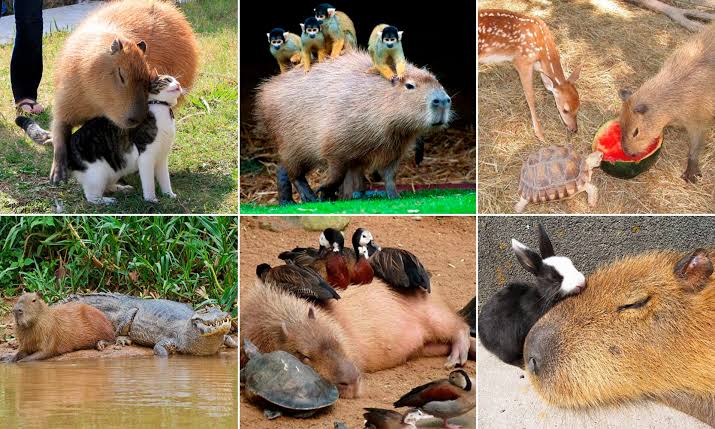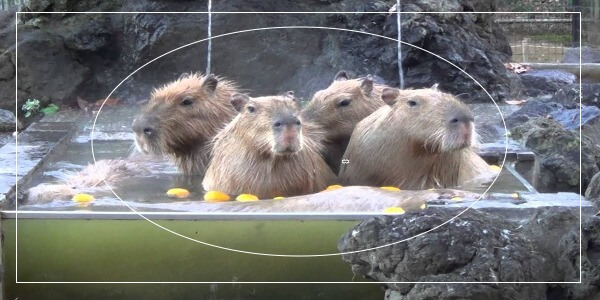What Do People Not Like About Capybaras?
Capybaras are often considered adorable and charming creatures. They’re known for their friendly demeanor, love of water, and even their ability to form unlikely friendships with other animals. However, as with any animal, not everyone is a fan. In fact, some people have very strong opinions about capybaras, and what they don’t like about them might surprise you. From their unusual eating habits to their tendency to invade swimming pools, capybaras have their fair share of detractors. So buckle up, and get ready to explore the reasons why some people just can’t seem to get on board with these lovable critters.
Property Damage
Capybaras may be adorable, but their large size and hearty appetite can make them a significant problem for farmers and property owners. These creatures are known to have a voracious appetite and will happily chow down on crops, gardens, and other vegetation. This can be especially problematic for farmers who are relying on their crops for income, as a group of hungry capybaras can quickly devastate an entire field.
Capybaras are also quite strong and have powerful teeth and claws, which they can use to tear apart fences, break into buildings, or otherwise cause property damage. In areas where capybaras are common, property owners often have to take extra precautions to protect their homes and structures from these determined animals.
Despite their cute appearance and friendly nature, capybaras can be quite destructive when they set their sights on something. For this reason, many people who live in areas where capybaras are prevalent have a deep dislike of these creatures, and they may go to great lengths to keep them away from their property.
Unwanted Visitors
For some people, the sight of a capybara wandering onto their property can be quite distressing. While these animals are generally friendly and harmless, they are also quite large and can be persistent in their investigations. Capybaras are curious by nature, and they can quickly become fixated on something that catches their interest, even if it means crossing onto someone else’s property.
This can be a real problem for homeowners who want to maintain their privacy and control over their property. Capybaras are known to wander freely and are often found in residential areas, which means that they may show up unexpectedly in someone’s backyard or garden. For people who don’t want to share their space with these large rodents, this can be a major annoyance.
Furthermore, while capybaras are generally docile, they can become territorial if they feel threatened or cornered. This means that if a homeowner tries to scare off a capybara, the animal may become aggressive and potentially dangerous.
In areas where capybaras are common, dealing with unwanted visitors can be an ongoing challenge. While many people find these creatures to be charming, others simply see them as a nuisance that they could do without.
Hygiene Concerns
Despite their cute and cuddly appearance, capybaras are not known for being the cleanest animals around. These creatures are semi-aquatic, and they spend a lot of time in the water, which can make them quite smelly. This can be a real turn-off for people who value cleanliness and hygiene.
Furthermore, capybaras are known to carry a variety of parasites and bacteria that can be harmful to humans. These include ticks, fleas, and lice, as well as diseases such as leptospirosis and salmonella. While the risk of contracting these diseases from capybaras is relatively low, it is still a concern for some people, especially those who are immunocompromised or who have small children.
For these reasons, some people simply do not want capybaras around their homes or in their communities. While they may be cute and charming, the potential health risks associated with these animals can outweigh any perceived benefits. As a result, hygiene concerns are often cited as a reason why some people dislike capybaras.
Regulatory Issues
While capybaras may be beloved by some, they are also a potential regulatory headache for others. In many areas, these animals are considered to be exotic pets, which means that there may be restrictions on owning them or breeding them. This can make it difficult for people who want to keep capybaras as pets, as they may have to navigate a complex legal landscape to do so.
Furthermore, capybaras can carry diseases that are harmful to humans, which can make them a liability in certain contexts. For example, if a capybara were to escape from its enclosure and come into contact with other people or animals, it could potentially spread diseases such as leptospirosis or salmonella. This can be a real concern for people who live in areas where capybaras are common, as well as for those who work with animals professionally.
In some cases, regulatory issues can even lead to the euthanasia of capybaras. For example, if a capybara is deemed to be a public health risk, it may be seized by authorities and put down. This can be heartbreaking for pet owners who have become attached to their capybaras, and it can also be a source of controversy within the wider community.
While capybaras may be cute and charming, they are not always easy to keep or regulate. For some people, the potential legal and health issues associated with these animals are simply too great, which can lead to a deep dislike or even fear of capybaras.
Conclusion
While capybaras are generally beloved for their cute and friendly nature, there are some reasons why people may not like them. Property damage is a common issue, as these animals can be quite destructive to crops, vegetation, and fences. Unwanted visitors are another concern, as capybaras are known to wander onto private property and become territorial if they feel threatened. Hygiene concerns are also a factor, as capybaras can be smelly and carry parasites and diseases that are harmful to humans. Finally, regulatory issues can make capybaras difficult to keep or regulate, which can lead to controversy and even euthanasia in some cases. While capybaras may be cute and charming, it’s important to consider these potential drawbacks before bringing them into our homes and communities.


![Why Do Capybaras Not Have Tails? - [Answered] Why Do Capybaras Not Have Tails](https://capybaratips.com/wp-content/uploads/2023/03/Capy-Tail-250x200.webp)


![How Long Do Capybaras Live? - [Answered] How Long Do Capybaras Live](https://capybaratips.com/wp-content/uploads/2023/03/Capybara-Pix-250x200.webp)



